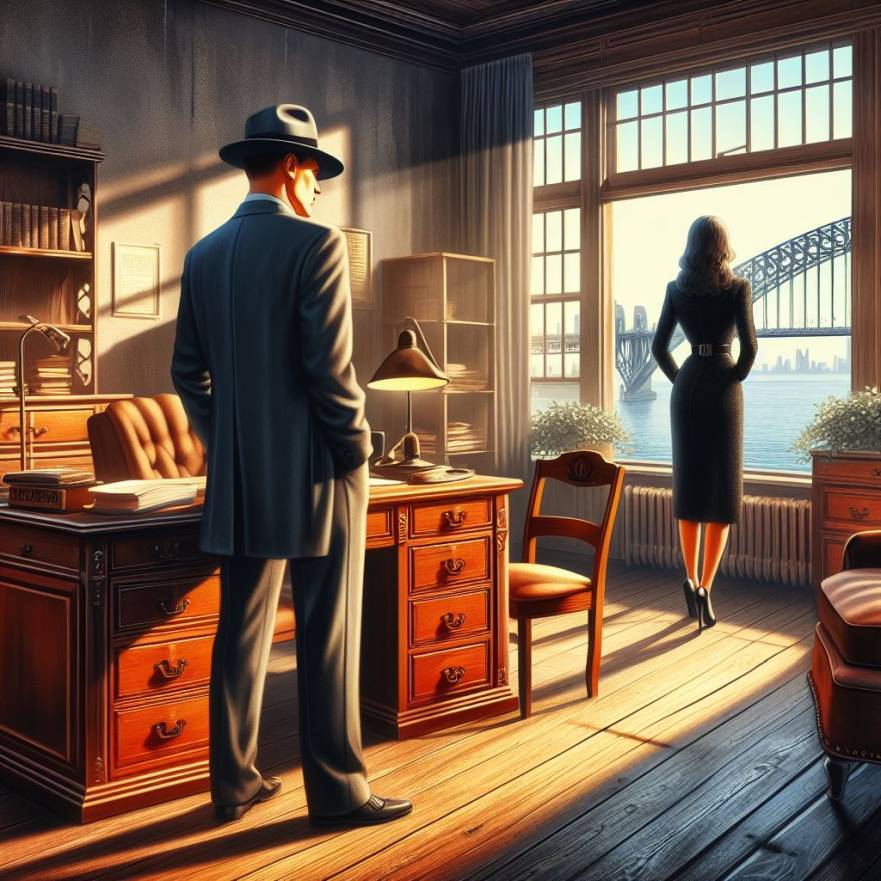Golden Gate by Marc Egnal

Golden Gate by Marc Egnal
The knocking on my office door seemed urgent and insistent, at least from where I sat. They say dogs have particularly keen hearing. Add to that short list private investigators struggling to make ends meet. The rapping definitely sounded like a client, not the pounding of the building manager who regularly came by to demand the rent.
Theresa Alvarez, my secretary and assistant, sashayed in from the outer office. “Señor Gleason, a Mrs. Douglas is here to see you,” she said. She rolled her eyes to suggest I was about to meet a hot little number. Then she flounced her hips in what I took to be a rhumba step. That dance craze, which had begun in Cuba and exploded in New York, had recently infected San Franciso.
Sarah Douglas was far more elegant than the ‘hot number’ Theresa’s gestures suggested. I don’t know which designer crafted her dark wool dress, but that item cost more than I earn in a year. For a moment I looked at my office through her eyes and felt downhearted. The rubber plant in the corner should have been given a quiet burial. The 1936 calendar on the wall was one I got at a Sinclair station. At least it depicted the Grand Canyon rather than the pinup of the month.
We introduced ourselves, although I already knew who Sarah Douglas was. Her name had been in the paper for the past two weeks, always referred to as the “grieving widow.” I was curious why she had come to my office. I’m not really a household name, except at times in my household, which consists of me and my adopted cat, Harry Fuzzball. The moniker was a private joke that I liked, and one my cat didn’t seem to mind.
“I see your name on the office directory, every time I come into the building,” she said in response to my question. It pays to advertise, I thought, although I really hadn’t done so. You may wonder how a down-on-his-luck PI has an office in the Russ Building, a posh place and at thirty-one stories the tallest edifice on the west coast. I moved here from a shabby storefront in 1933 when half the offices were vacant, and managers stood out on Montgomery Avenue grabbing warm bodies willing to sign a one-year lease. My office on the twenty-ninth floor has two fair-sized rooms and a great view of the Bay Bridge which was nearing completion. If I leaned against the window, I could glimpse the Golden Gate Bridge which also soon would be finished. I had lots of time to look at both of them, given my client list.
Sarah Douglas’s husband, Cedric Douglas, had been a high-powered lawyer, whose firm, Pierson, Sanders, and Fox, occupied a suite of offices on the second floor. Two weeks ago, at about 3 in the morning, he had put a gun to his head and killed himself – at least that’s what all the papers reported. His firm had been involved with both bridges, overseeing contracts worth millions, and – according to those same newspapers – he had shamelessly stolen from those accounts, saw no way out, and so, bang!
Sarah got right to the point. She was that kind of a dame. “Mr. Gleason,” she said, “I want you to find the men who murdered my husband.”
As desperate as I was for work, I could see myself wading in over my head. “That sounds like a job for the police,” I responded. “They have rooms full of detectives, a lot of them sitting around on their duffs, collecting fat paychecks. Your taxes are paying them.”
“I’ve been there,” she said. “More than once. The last time I spoke to a detective, he told me to back off. He warned me if I pushed, it could further hurt my husband’s reputation. He hinted it would be dangerous for me too.”
I liked the strength in her voice, its deep resonances. Threats were not going to make her back down. I’m sure that living large in Nob Hill had contributed to her composure. The look in her eyes, which were somewhere between hazel and green, made clear her resolve.
“What makes you think it was murder?” I asked. I didn’t want to sink into the La Brea tar pits of a fruitless investigation. “Your husband left a suicide note. His fingerprints, and no one else’s, were on the gun. His door was locked. The night crew didn’t see anyone wandering around those offices.” I had read the papers. The story had been big news in San Fran. It had been all the buzz in the building.
“Take a look at this,” she said, and produced the suicide note. I was surprised the police had let her keep that evidence. “I insisted upon it,” she said, in answer to my question. “It’s the last letter I’ll ever get from Cedric.”
She put the note on my desk and beside it a letter he had written to her. The letter gushed like a cheap romance novel. It was a bit rumpled and looked a few years old. I know if I ever got a missive like that, I would have preserved it and framed it. I folded the letter, leaving just the first few lines visible. I wanted to respect her privacy, and those few lines were enough to compare the scripts. Whoever had forged the suicide note had done B or B- work. The “i”s and “s”s were okay, but the “g”s and “p”s were only passable, and the “k”s and “m”s were a mess – nothing like Cedric’s handwriting.
When I told her I’d take the case she asked me what my rate was. Because I’m a fool I gave her the same answer I give every client, “Forty dollars a day and expenses,” although I’m sure she would have paid twice as much. “Solve this one, and there will be a big bonus,” she said. “And I’ll make that forty dollars a day, fifty dollars. Cedric taught me to be generous.” For the first time I could see tears glistening in her eyes.
I asked her which police detective she’d been dealing with. The one who ordered her to back off. “Todd Murphy,” she said. I groaned inwardly and outwardly. That was about as bad a choice as anyone could make.
For two years, 1917 and 1918, I had been in the army, a stint that ended with seven weeks of combat in France. In Camp Meade where I did my basic training, we had a drill sergeant whose great pleasure was shouting at us and calling us every foul name he could think of. Murphy reminded me of him. I told Sarah (we were now on a first-name basis) I would start my investigation by speaking to him.
Murphy was a beefy man who slicked back his curly red hair and kept it in place with a pint of Brylcream. He welcomed me for an instant until he found what I was looking into.
“Case closed,” he said. “Done. Finito.” I hadn’t realized his expertise extended to foreign languages.
When I told Murphy I wasn’t sure Cedric died by his own hand, his veneer of politeness slowly cracked. “Frank,” he said, “stay the hell away from the Douglas suicide. There’s nothing to see there, and it’s not going to be good for your health to look further.” For emphasis he sprinkled in a few words I had heard in my army days. He reminded me of that drill sergeant.
I guess he wanted to add an exclamation point to his warning. On my way back to the office, three toughs grabbed me and pushed me into an alleyway. To my credit, I got in a few blows before one of them pinned back my arms while the other two pounded my ribs. Before the biggest ugly knocked me out with a sap, his friend said, “Next time, we’ll set you in a plot on Yerba Buena.” So, it was bridge related. Yerba Buena was the island in the Bay that anchored the two spans of the Bay Bridge.
A policeman found me sprawled on the sidewalk. Maybe Murphy had felt guilty and sent him. The cop took me took me to Saint Francis Hospital where they bandaged me up, told me I looked terrible, and as soon as I could walk sent me on my way.
Theresa was suitably concerned when I hobbled in and collapsed in the old leather chair we keep for tired clients. After expressing her sympathy, she told me I looked terrible. “That’s the general opinion,” I reassured her.
I now knew several things for certain, apart from how difficult it is to breathe after a cement truck hits your ribs. Cedric was innocent. Whoever had killed him and forged the note was deathly scared of anyone nosing around. And clearly, the miscreants had deep pockets because Murphy and the higher ups at SFPD wouldn’t sell themselves cheaply.
I asked Theresa to go to the archives of the Chronicle and the Examiner and dig into any scandals tied to the financing of the two bridges. Who was under suspicion? In addition to sharing the latest dance crazes with me, she was a remarkable researcher. I didn’t have to tell her to be careful. She got that message from the bandage on my head.
I had two calls to make. One was to Sarah Douglas. Just hearing the music of her voice, would have been enough reason to ring her up. But I also had the idea that Cedric might have written up a document as insurance in case someone wanted to make him the fall guy – which they did. Sarah promised to look.
The second call was to Yael Portnoy, likely the savviest accountant in the city. I knew Yael from my time in the army. We were two young men from San Francisco, thrown together in that strange environment. I admired him. As the only Jew in Company Charlie, Yael was the target of a lot of comments, some friendly and others less so. He deflected those remarks, sometimes with humor and other times with his fists. We had kept in touch over the years.
I explained to him what I wanted. “You can’t afford me,” he responded. I explained that my client could, and he agreed to look into the questions I had raised. He knew the auditors on both construction projects. After I told him there were dangerous characters involved, he said his hourly rate just went up. It was hardship pay. Yael said he’d get back to me soon. I told him to duck in the trenches when the bullets started flying. I didn’t realize how appropriate that advice would be.
Sarah called me back about ten minutes later. “I think I’ve found what you’re looking for,” she said. She sounded agitated, not the calm, confident person who had marched into my office. I mentioned a small Greek restaurant on Union Street and told her to meet me there in an hour.
“Do your best not to be followed,” I cautioned.
“I know what to do,” she replied.
I thought of walking to the restaurant, but when I went to the lobby one of the three uglies was standing across the street, failing in his efforts to look inconspicuous. I called over Fred Asper, the reassuringly bulky man who served as building security, and pointed out that pitiful effort at surveillance. Fred nodded, taking note of the situation. The plaster on my head helped make my point.
Instead of walking, I drove there in style in my 1930 Dodge coupe. I had parked it in the lot behind the building. Sarah was sitting in a booth when I arrived. She was about to say what a quaint restaurant it was, when she saw my banged-up face and bandaged skull. She put her hand on mine and demanded I tell her what happened.
Her gesture made me catch my breath. I gave her the briefest description of the encounter.
“Frank, I’m closing down this case,” she said. “I’ll pay your time and expenses. But I don’t want to pursue this dangerous investigation anymore.”
She had the same throaty voice and hazel eyes, but this was not the fearless woman I had first met.
“You said you had found a key document,” I replied.
After a great deal of hesitation, she drew a folded piece of paper from her purse and pushed it across the table. It read:
k. g. f. $115,000 10.18.35
s. i. l. $95,000 1.7.36
w. p. o. $141,000 2.21.36
“Who do these initials refer to?” I asked.
Her eyes teared up and she started sobbing when she spoke. As little as I understand men, I understand women less. “They’re partners in Cedric’s firm: Kerry Fox, Sanders Lewellyn, and William Ogilvy.”
That slip of paper, I knew, was a key to the puzzle. I felt like that French officer who had lifted up a rock and found the Rosetta Stone.
“Can I take this,” I asked.
“No, you can copy it. But it doesn’t matter, your investigation is over.”
She gave no explanation for her sudden change of heart. A little danger would never have scared off the woman I first met. Something about the note troubled me. “Cedric didn’t write this,” I said. I now knew his handwriting.
“No, he dictated it to me. He wanted me to remember it, just in case something happened.” I looked at the note again, this time with a growing sense of unease.
“Give me two more days,” I said. “Then I’ll wrap it up. Promise. Results or no results. I’ve put too much of myself into this investigation to shut it down just yet.”
She had recovered her composure. “Okay, two days, no more. And be very careful. I’ll feel responsible if anything happens to you.”
If the circumstances had been different, I could have gone for a dame like that. As it was, the touch of her hand would linger in my memory for many months.
The next morning, I went to Yael’s office. There were no pleasantries, no greetings for an old friend. Instead, he said, “What sort of michigas have you gotten me into?” I don’t speak Yiddish, but I substituted a four-letter Anglo-Saxon word and got the drift.
“I have a wife and three little girls,” he continued. “And they shot at me as I left Roy West’s office.” West was one of the auditors for the construction of the Golden Gate Bridge. The goons must have had someone in the auditor’s office on their payroll. “Your client owes me for a new back window,” he stated.
“This will all be wrapped up by tomorrow,” I reassured him. “You and your family will be safe. What did you find out?”
“Well, they know somebody’s been skimming the payments. But the crooks covered their trail well with dummy corporations and a multitude of invoices. It’s not a lot of money they’ve stolen, maybe $400,000 in all.”
Yael and I had a different idea what a “lot of money” was. I pointed out to him that FDR made only $75,000 a year. Then I showed him the paper with the numbers I copied from Sarah and explained who the initials pointed to.
“That’s it,” he said, leaping up with a big smile on his face. “The amounts and dates look like what I heard from the auditors. You nailed those goniffs.” I was getting the hang of the Yiddish language.
“There’s an investigator from the Treasury Department who works with the auditors,” Yael continued. “He’ll be most interested in this information.”
“Hold off for a day,” I told Yael. “I have to tie up some loose ends before we talk to law enforcement.”
They were more than loose ends. They were large cords that might choke someone I cared about: Sarah Douglas. After scrutinizing the initials on that slip of paper, I was almost certain she had written Cedric’s suicide note.
I could have conveniently forgotten my suspicions. Finding the crooks would have been a good day’s work. But the foolish, honest part of me didn’t want to drop the matter just yet.
When I got back to the office, I brought Theresa up to date on everything: Sarah’s change of heart, the note with the initials, Yael’s response, and finally, my concerns about Sarah’s involvement in the Cedric’s death.
“Caramba!” Theresa said. It was about as strong as her swearing got, at least in my presence. I asked her what she had learned from the newspapers.
“Not much,” she said. “No mention of problems until Douglas’s death. Now reporters are ‘looking into’ those charges.”
She saw me sigh. “No te preocupes, Señor Gleason” she said. It was a comforting phrase. It meant “don’t worry.” “Just wait until after lunch,” she added. Theresa had a good friend in the offices of Pierson, Sanders, and Fox. That friend promised to be a much better source than the daily fishwrap. More than anyone, secretaries know what goes down in an office. They know who’s booking a tryst with their mistress, sending apology flowers to the wife, or who screams at subordinates. And you can’t always count on staff to be discreet when they get together with friends. I wished Theresa well.
After her lunch she came into my office with a big smile and even a little rhumba shake of her hips. Then she spilled the beans, a lot of beans, to me.
Here’s the story based on what she told me, my knowledge, and a little light speculation to make sense of it all. I think you’ll see which part is which.
About two years ago Cedric Douglas started an affair with Mabel Fox. She’s the wife of Kerry Fox, one of principals in the firm. For about a year they managed it discretely. Then Sarah and Kerry got wind of it. So, they started their own relationship. At first it was revenge – but for Sarah it soon became love.
Here’s where the plot thickens. It must have been about that time that Kerry Fox along with Sanders Lewellyn and William Ogilvy began their thievery. Feeling the auditors breathing down their backs, they decided to make Cedric Douglas the fall guy.
Sarah, in love with Kerry and angry at her husband, helped. She wrote the suicide note and must have informed Kerry about her husband’s schedule.
Did Kerry Fox kill Cedric? If he didn’t, he surely arranged it, and set up the scene so it appeared to be a suicide.
But with Cedric dead, Kerry had no more use for Sarah. She called him repeatedly at the office. He wouldn’t take her calls.
And that’s when Sarah, a woman scorned, came to my office. She wanted me to find the killer, but in fact she knew who he was and was out for revenge. The next day she wasn’t so sure she wanted to go after the man she had loved.
I called Yael and told him to go ahead and talk to the Treasury agent. I asked him to leave me out of it if he could. I didn’t want to get tangled in the webs spun by these wealthy, self-centered individuals.
What happened next? I called Sarah and told her I had passed along the information about the three thieves. If I had to guess, they’ll be fined, forced to make restitution, and not spend a day in jail. They’re too rich to be imprisoned.
No one, I’m sure, will mention Sarah’s involvement. Thanks to her husband’s “suicide,” she’ll come out of the whole mess a much wealthier woman.
To her credit, she paid my daily rate and gave me the promised bonus, even though I hadn’t fingered the killer – but then she knew who it was. Yael, incidentally, got a larger check than I did. His hourly rates were higher.
Was that justice? Not remotely. I swallowed hard and kept to myself what I knew about Sarah’s complicity in the murder of Cedric Douglas. That’s the rottenness of my profession. You don’t hire a PI to find righteousness. I shared the bonus with Theresa. She deserved it.
* * * * THE END * * * *
Copyright Marc Egnal 2024




Gritty and direct, with a sweet little twist at the end – just the way I like ’em. Well done!
Thanks, Dawn. It’s my first published story. Your comment is appreciated.
Best,
Marc